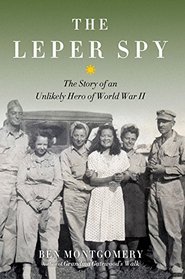This is actually two books. The first half covers some of the heroine's story, but is mostly composed with the fight for the Philippines when the Japanese invaded. It also covers the horrors the Japanese inflicted on the Filipinos and Americans. While not mentioned in the book, one out of every 20 Filipinos died---often horribly---during the Japanese occupation.
I got a little upset with the author's hero worship of Douglas MacArthur. The book was published in 2017 and so we now know MacArthur's "greatness" wasn't as great as he would like us to think. His proposal to resign his commission and fight as a private was just part of his well-known theatrics. But this book isn't about him, so I won't comment further.
As I've read extensively about the Filipino resistance to the Japanese, probably the greatest guerrilla resistance movement in history, I was disturbed with the time line the author followed describing it. He jumped around a lot in his time line and makes it appear the resistance was organized on Day One after the surrender. Actually, it took many months and wasn't strong enough to counter the Japanese until about two years after the American/Filipino surrender. But eventually, the Filipino resistance controlled the countryside and entire islands, while the Japanese controlled just the larger towns and cities. There are numerous books about the resistance, so if you are interested read one or more. I always recommend "They Fought Alone" by John Keats, if you can find it.
Finally, the second half of the book was concerned with Joey's life after the end of the war until she died in 1996. Read her Wikipedia page---Josefina Guerrero---for more information.
Frankly, her courageous actions during the war almost paled with her actions after it, when she worked tirelessly to improve the life of persons affected with Hansen's Disease, which most people call leprosy. I found it interesting the author used the term "leper" in the title when the book stresses this is not a term to use, as it is often abused.
But I didn't find it difficult to understand how we could award a medal to Joey, for saving the lives of hundreds of Americans, but not allow her into the U.S. for treatment, and then start deportation proceedings against her and denying her the right to be a citizen, despite a huge groundswell of support from many Americans. Despite many bills proposed to Congress, that organization didn't react until the "Right People"---those with big pockets and names to endorse political candidates---became involved. I guess Congress and our country's bureaucracy hasn't changed much since then.
I got a little upset with the author's hero worship of Douglas MacArthur. The book was published in 2017 and so we now know MacArthur's "greatness" wasn't as great as he would like us to think. His proposal to resign his commission and fight as a private was just part of his well-known theatrics. But this book isn't about him, so I won't comment further.
As I've read extensively about the Filipino resistance to the Japanese, probably the greatest guerrilla resistance movement in history, I was disturbed with the time line the author followed describing it. He jumped around a lot in his time line and makes it appear the resistance was organized on Day One after the surrender. Actually, it took many months and wasn't strong enough to counter the Japanese until about two years after the American/Filipino surrender. But eventually, the Filipino resistance controlled the countryside and entire islands, while the Japanese controlled just the larger towns and cities. There are numerous books about the resistance, so if you are interested read one or more. I always recommend "They Fought Alone" by John Keats, if you can find it.
Finally, the second half of the book was concerned with Joey's life after the end of the war until she died in 1996. Read her Wikipedia page---Josefina Guerrero---for more information.
Frankly, her courageous actions during the war almost paled with her actions after it, when she worked tirelessly to improve the life of persons affected with Hansen's Disease, which most people call leprosy. I found it interesting the author used the term "leper" in the title when the book stresses this is not a term to use, as it is often abused.
But I didn't find it difficult to understand how we could award a medal to Joey, for saving the lives of hundreds of Americans, but not allow her into the U.S. for treatment, and then start deportation proceedings against her and denying her the right to be a citizen, despite a huge groundswell of support from many Americans. Despite many bills proposed to Congress, that organization didn't react until the "Right People"---those with big pockets and names to endorse political candidates---became involved. I guess Congress and our country's bureaucracy hasn't changed much since then.




